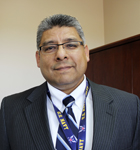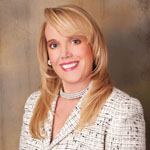New York City native Joe Machicote nurtures a spirit of teamwork as VP of organizational development at Snyder’s-Lance
1976 Joe Machicote, a kid from Harlem, stood with his mom in the payday line at a New York City bank. A group of women joked in front of them. One imagined owning a Mercedes Benz. Another deadpanned, “Yeah right, when I’m rich.” Even at 12 years old, Machicote recognized that she had given up. “I looked at her and thought, ‘That’s where your dreams end?’” Machicote recalls. “I told myself I wouldn’t wait for ‘one day.’ I would keep achieving.” Machicote developed a philosophy that he continues to live by today: The future that you see in your head depends completely on the actions you take today.
1982-1995 When he donned his first apron, Machicote was still dreaming of becoming a computer scientist. He entered Manhattanville College as a student and the Compass Group as a potwasher. He was a hit on kitchen patrol, and once he rose from potwasher to dishwasher, then prep cook, it became obvious to Machicote that food was his true calling. Though he didn’t love the messy jobs at first, he loved coming to work. His supervisor was the difference. “He always made sure I knew how important my job was,” he says. And when Machicote moved up to student manager, he says, “All of the lessons I had been taught from my supervisor about how to treat people and encourage them to grow, I used.” The tradition continued. Under Machicote, employees didn’t miss work—they loved where they worked. The president took notice. He promoted Machicote to training manager of the FLIK International account where he spent several years bolstering the company’s base and passing down the philosophy bestowed on him.
1999-2007 One of Machicote’s most valuable skills is his perception. No matter with whom he works, he focuses on likenesses and delivering a common goal. Not everyone shares that mind-set. Watching his single mother raise two boys and continue her education meant Machicote also saw people tell her she couldn’t achieve her goals. In his first job out of college, Machicote excelled in fine-dining management, but he was denied the spot in catering sales he desired. His supervisor told him the clientele wouldn’t work with a Black-Hispanic person. Though harsh, those experiences were formative for Machicote. He began devoting himself to diversity and projects that countered the prejudice he knew so personally. Machicote became the vice president of diversity for Compass Group and got involved in a host of initiatives. He was the board president of the Community Culinary School of Charlotte, North Carolina, a transitional institution that helps put the unemployable to work. He created Diversonomix, a diversity management consultancy. He served on the board of the Women’s Foodservice Forum, an organization committed to advancing women leaders in the industry. And, for almost 10 years, he was a member of and became board president of the Diversity Council of the Carolinas.
2007-2011 After 23 years in food preparation and service, Machicote made the move to Lance, Inc., a food-manufacturing company that allowed him to remain in the industry he loved while pursuing the causes that mattered to him as vice president of diversity and inclusion. Then, in 2011, the 100-year-old company merged with Snyder’s, an equally established snack-food giant, and with the inception of Snyder’s-Lance, Inc. came a host of challenges for Machicote, the new vice president of organizational development. For Machicote the merger meant bringing together people, ideas, systems, and finance all while maintaining a culture. “We started with our philosophy, which is to grow people in character and capability,” he explains. Now with Snyder’s-Lance thriving, Machicote says the work was well worth the effort. “Neither of our companies could have achieved the next level without each other, so we are far better together than apart.”
Today Even when he’s not at work, Machicote likes to spend his free time doing some of the same things he does on the clock. That’s because while he knows much of his success is due to the goal-oriented game plan he devised for himself, he also found a helping hand in the heart of Harlem. “We were latchkey kids,” Machicote says of his brother and himself. “Thanks to New York City’s meal programs, we had lunch every day. We could go to the community center to ask advice.” When Machicote creates an environment where people love coming to work, they are more productive. The same principle applies to communities, like those in Charlotte where Machicote continues to contribute to programs that reach into neighborhoods to set people on a stable path. “Diversity, for me, is about creating an environment where everyone has the same opportunities to succeed,” he says. “That is my life’s work.”

